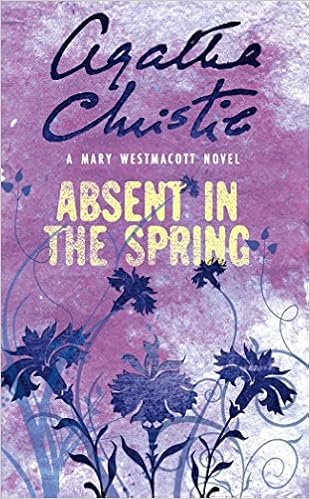Rereading Absent in the Spring (Agatha Christie writing as Mary Westmacott)
July 23, 2018

One of the things I like most about traveling is the
complete break from the usual routine. I almost always come back from a trip
refreshed and ready to make changes in my life…whether or not those changes
actually take place. Sometimes it takes leaving home to see myself more
clearly.
It can also be a little bit frightening.
Absent was one of Christie’s favorite books. She
completed it in three days straight, and wrote in her autobiography that it was
“one book that has satisfied me completely…. It was the picture of a woman with
a complete image of herself, of what she was, but about which she was
completely mistaken…. What brought about this revelation would be the fact that
for the first time in her life she was alone—completely alone—for four or five
days.”
In the book, self-satisfied, middle-aged Englishwoman Joan
Scudamore finds herself stranded at a rest house in the desert on her way home
from visiting her daughter in Iraq. There are no other travelers for company,
she runs out of things to read, uses up her writing paper, and has no sewing or
handiwork to occupy her. She’s left with nothing to do but think and remember.
At first, this makes her uneasy:
“The truth was, she reflected, that she had always led such a full and occupied life. So much interest in it. It was a civilized life. And if you had all that balance and proportion in your life, it certainly left you rather at a loss when you were faced with the barren uselessness of doing nothing at all. The more useful and cultured a woman you were, the more difficult it made it.”
And then downright frightened, as her thoughts take her
places she’d rather not go.
“There was nothing to be afraid of in being alone—nothing at all.”
Eventually, she comes to see herself as she really is, not
as she’s told herself she is all her life.
“She had got to know, once and for all, just what kind of a woman Joan Scudamore was….”
The title comes from a line in Shakespeare’s Sonnet 98,
“From you have I been absent in the spring.”
One of Joan’s realizations is that even though she really loves her
husband, she’s been “absent” from him in the ways that really matter.
When Joan returns to England, will she keep her hard-won
self-knowledge and make changes? Or will she return to her old ways? I won’t
spoil the end for you—you’ll have to read it for yourself.
Absent in the Spring was written in the 1940s, but
anyone whose life is overfull with commitments, social media, and general
busy-ness might recognize in themselves the tendency to fill up time with doing
in order to avoid uncomfortable thinking.








4 comments
Kathy I posted comment on google - but not sure you will receive it. This looks like a great read - haven't read it. Thanks for sharing. Hugs!
ReplyDeleteYou're welcome, Debbie. It's definitely worth reading.
DeleteI just reserved it at the library, sounds uncomfortably interesting.
ReplyDeleteHi, Susan! "Uncomfortably interesting" is the perfect term. Hope you like it!
Delete